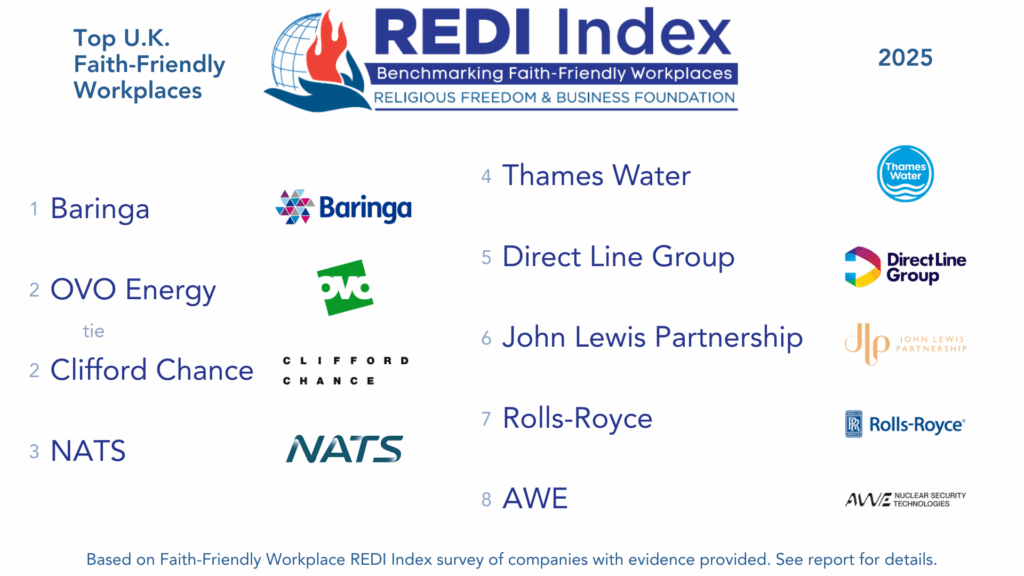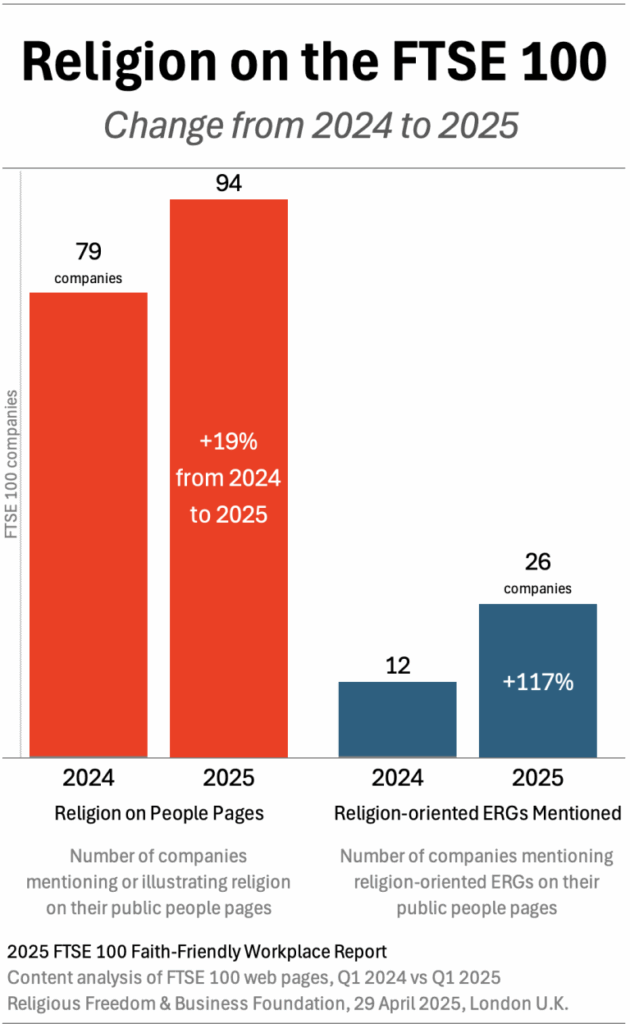A quiet revolution is sweeping through Britain’s boardrooms: faith is back in the spotlight — and this time, it’s business-led, confirms the latest Religious Equity, Diversity & Inclusion (REDI) Index.
Baringa Partners is 2025’s most faith-friendly workplace in the UK, retaining its top position in the Religious Freedom & Business Foundation’s second annual REDI Index. The firm tops the 2025 REDI Index for the second consecutive year as FTSE 100 companies increasingly recognise faith inclusion as a workplace advantage. In joint second place are OVO Energy and Clifford Chance, while NATS, the UK’s leading air traffic service, ranks third.
These top performers are not the only ones embracing faith-friendly work cultures. In fact, a growing number of FTSE 100 companies are making religion and belief a strategic part of their diversity frameworks. Notably, Thames Water, Direct Line Group, John Lewis Partnership, Rolls-Royce and AWE scored highly in the index, which evaluates 11 key indicators of faith-friendly best practices. These include dress and dietary accommodations, honoring holy days, and supporting faith-and-belief employee resource groups (ERGs).

SURGE IN FAITH INCLUSION
This surge in faith inclusion mirrors a broader cultural shift. Recent data shows a noticeable uptick in religious interest among young adults in the UK. A generation often labelled as secular is now exploring spirituality in nuanced and diverse ways.
“This surge in workplaces that are faith-and-belief friendly matches a recent uptick in young people’s interest in religion in the UK,” said Dr Brian Grim, President of the Religious Freedom & Business Foundation. “Having a workplace that is welcoming to people for whom faith or belief is of central importance gives organisations a critical advantage in recruitment, retention and ultimately business success.”
FTSE 100 FIRMS EMBRACE FAITH INCLUSION
The REDI Index findings align with a broader trend across the FTSE 100, where a 19% increase in companies acknowledging religion on their employee engagement web pages has been recorded. That’s up from 79 in 2024 to 94 in 2025. More striking is the 117% rise in companies supporting formal faith-based ERGs, from just 12 in 2024 to 26 in 2025. These groups provide structured spaces for employees to connect over shared beliefs — religious or philosophical. They also help companies cultivate belonging and authenticity in the workplace.
Accompanying these efforts, the average REDI Monitor score rose from 3.9 to 5.7, and the median doubled from 2 to 4. A total of 54 companies improved their scores year-over-year, compared to just 16 that declined. “These changes are particularly remarkable given the current global pushback against diversity programmes, under which most faith initiatives have traditionally been situated,” added Grim. “It appears religion is not getting lost amidst the disruption to the general field.”

FAITH AS A COMPETITIVE ADVANTAGE
The REDI Index doesn’t merely serve as a scoreboard — it acts as a strategic compass for organisations. Each of the 11 benchmark indicators measures not just the existence of policies, but their depth, scope, and substantiation with internal and external evidence. An optional 12th bonus question allows companies to highlight innovative, inclusive faith initiatives that might fall outside traditional frameworks — a recognition that faith inclusion isn’t one-size-fits-all.
As more British companies recognise religion as a component of identity that shapes values, ethics, and work culture, forward-thinking firms are leaning in — not away. With faith quietly re-emerging as a force in public and private life, corporate Britain’s embracing of spiritual diversity may well prove to be a defining cultural shift of this business decade. Click here to read the full report.








































